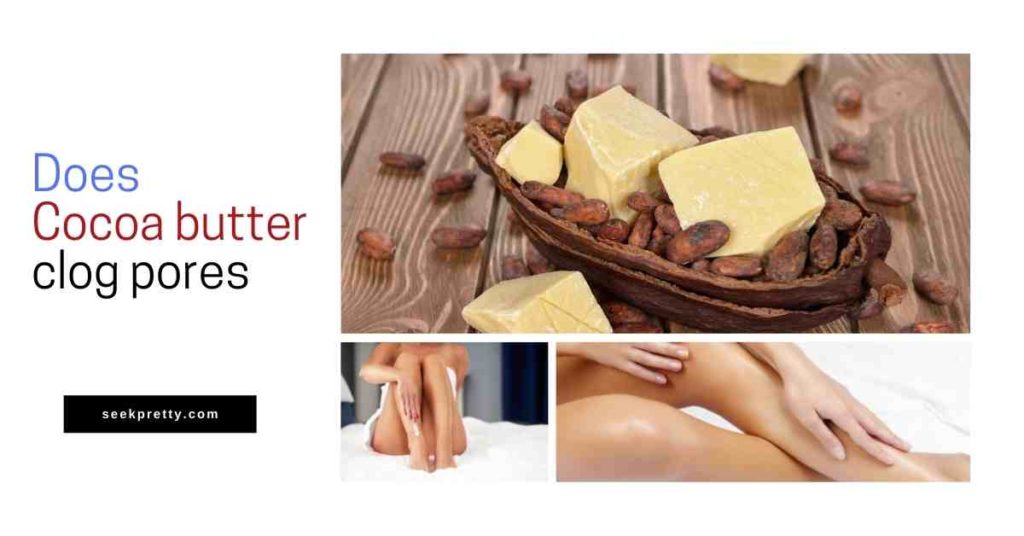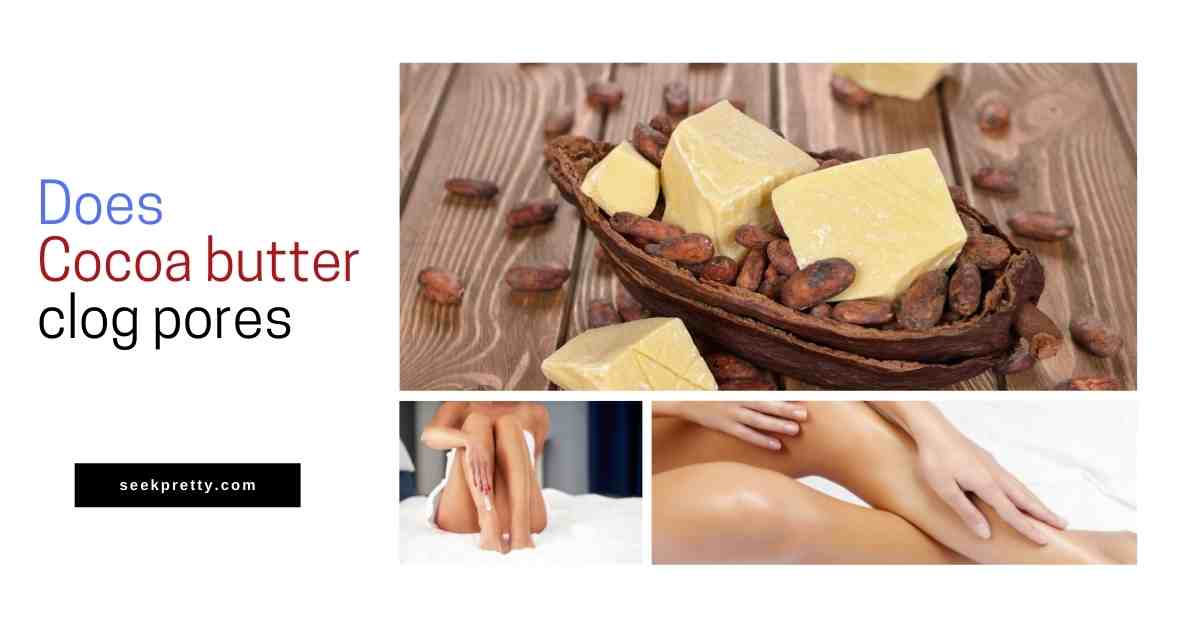Cocoa butter is a type of fat that is derived from cocoa beans. Cocoa butter is comedogenic meaning it can clog pores very easily. It is solid at room temperature and has a creamy texture. Cocoa butter has been used for centuries as a moisturiser and to treat skin conditions because it contains antioxidants that can help protect the skin from damage.
In this article I will look at the following. I will consider how likely cocoa butter is to clog your pores. There are different levels of comedogenic products and some are much more pore clogging than others. Let’s also take a look at whether or not it’s a good idea to use cocoa butter products on your face. Some of you experiencing pimples or acne also want to know whether cocoa butter is going to help or worsen your skin condition and in my opinion it’s not a good product for oily or acne prone skin.

Contents
Quick Q&A – Cocoa butter
- Can cocoa butter cause acne? Yes, cocoa butter is comedogenic and can clog pores, leading to breakouts and acne.
- Is cocoa butter good for dry skin? Yes, cocoa butter is good for dry skin as it is high in fatty acids that can moisturize and repair the skin barrier.
- What are some alternatives to cocoa butter for oily or acne-prone skin? Some alternatives to cocoa butter for oily or acne-prone skin include shea butter, coconut oil, olive oil, and jojoba oil.
- Does cocoa butter reduce the appearance of scars? Yes, cocoa butter has been shown to be somewhat effective in reducing the appearance of scars and stretch marks.
- Can cocoa butter be used on the face? While cocoa butter can be used on the face, it is not recommended for those with oily or acne-prone skin as it can clog pores. It is better suited for use on the body.
Is cocoa butter good for pores ?
While cocoa butter has many beneficial properties, it is not the best choice for people with oily or acne-prone skin. Cocoa butter is thick and oily, and while it contains oleic acid that can dissolve sebum, the substance that clogs pores, it is likely to clog pores itself. Moreover, cocoa butter can cause irritation for those with sensitive skin. Instead, it is recommended to use non-comedogenic oils such as jojoba or almond oil for skincare products.
Cocoa butter is high in fatty acids, which can help to moisturize and repair the skin barrier. It also contains antioxidants that can help to protect the skin from damage but it is comedogenic so likely to clog pores. Cocoa butter has been shown to be somewhat effective in reducing the appearance of scars and stretch marks. When used on the face, it can help to hydrate the skin and reduce the appearance of fine lines and wrinkles.
If you have oily skin some brands creating cocoa butter based products claim that cocoa butter can help to regulate the production of sebum, which can clog pores. This may be because cocoa butter contains oleic acid. Olaic acid can help to dissolve sebum, the oily substance that clogs pores but the butter itself is very thick and oily so can itself clog pores even though it might fight serum production.
Some brands claim cocoa butter can also help to reduce inflammation and redness. However, if you have sensitive or oily skin, cocoa butter may not be the best choice for you. There are other oils that can be used that will not clog pores or cause irritation. Try using jojoba oil or almond oil skincare products.
I want to compare a few of the main oils used in skincare products so you can see how cocoa butter compares with them. This should give you an idea of which oils to look for when you next buy a moisturiser or other skincare products. To compare the different oils and see which are most likely to clog your pores I’m going to use the rating from the comedogenic scale which rates oils from 0-5, with 0 big the least likely to clog pores and 5 being most likely.
Comedogenic Scale
4
4
2
1
2
2
As you can see in the table above, Cocoa butter is similar to coconut oil in the way it is very highly comedogenic and highly likely to block pores. Jojoba oil and Mango butter are safe options if you have oily skin or suffer with acne, but skincare products using shea butter as their main ingredient would be a better choice and much less likely to clog up your pores.
What happens when pores are clogged ?
When your pores are clogged, it can lead to breakouts, blackheads, and enlarged pores. It is important to clean your face properly and use a pore-cleansing strip to remove any dirt or oil that’s stuck in your pores. Moisturizing your skin is also crucial to keep it hydrated and healthy. Clogging your pores blocks the natural process of oil and sweat release and can cause your sweat glands to block.
If your pores are clogged, it means that they are blocked with oil, dirt, and dead skin cells. This can happen when you don’t clean your face properly, or if you use products that are too heavy for your skin type. When your pores are clogged, it can lead to breakouts and blackheads. When your pores get blocked , you may notice that your skin feels more oily than usual. Your makeup may also appear to be cakey or flaky. If you have large pores, you may also notice that they look enlarged. Blackheads and whiteheads can also form when your pores are blocked.
If you’re noticing any of these changes in your skin, it ‘s important to take action. First, you’ll want to clean your face with a gentle cleanser. You may also want to use a pore-cleansing strip to help remove any dirt or oil that’s stuck in your pores. Finally, be sure to moisturize your skin to keep it hydrated and healthy.
Your pores are there to let your skin release oils and sweat which are healthy and natural processes. Clogging your pores blocks this natural process and can even cause your sweat glands to block.
Cocoa butter and pimples – does it help acne ?
Cocoa butter is often touted as an acne-fighting ingredient, but the reality is that it can actually make breakouts worse. That’s because cocoa butter is a comedogenic substance, meaning it can clog pores. When pores become clogged, they provide a breeding ground for acne-causing bacteria. So, if you’re struggling with breakouts, you might want to steer clear of products that contain cocoa butter.
Of course, everyone’s skin is different, so it’s possible that cocoa butter won’t clog your pores. If you’re not sure whether or not it will cause breakouts, try doing a patch test on a small area of skin before using it. I would suggest you consult with a dermatologist before using cocoa butter on your face because there is a good chance it could make your acne worse.
If you previously had acne and have acne scars, I’ve heard that cocoa butter might help to smooth out and reduce the appearance of your scars.
Benefits of Cocoa Butter
While cocoa butter is comedogenic and can clog pores, it does have some benefits for the skin. Cocoa butter is high in fatty acids, which can help to moisturize and repair the skin barrier. It also contains antioxidants that can help to protect the skin from damage. Additionally, cocoa butter has been shown to be somewhat effective in reducing the appearance of scars and stretch marks. When used on the face, it can help to hydrate the skin and reduce the appearance of fine lines and wrinkles.
Alternatives to Cocoa Butter
If you have oily or acne-prone skin, there are other oils and ingredients that you can use in your skincare routine that are less likely to clog pores. Some alternatives to cocoa butter include shea butter, coconut oil, olive oil, and jojoba oil. These oils are non-comedogenic and can help to moisturize the skin without clogging pores.
Is it a good idea to put cocoa butter on your face ?
Cocoa butter is good for moisturising your body but it can clog your pores if used on your face. If you have dry skin, cocoa butter will add moisture and help to plump up the appearance of your skin. However, if you are prone to breakouts or have oily skin, cocoa butter may not be the best choice for you as it can further clog pores. instead, opt for an oil-free moisturiser.
If you are going to use cocoa butter I’d recommend you try it out on your body. I use cocoa butter products on my legs and they feel really smooth afterwards.
Final thoughts
Cocoa butter is likely to clog your pores, especially when used on your face. If you have oily or acne prone skin it is even more likely that you will experience problems if you apply cocoa butter on your face often. That’s not to say you shouldn’t try a small patch test but I think you’d be much better off looking elsewhere for skincare products containing oils that are non-comedogenic.
Some of the most popular substitutes for cocoa oil include shea butter, coconut oil, olive oil, and jojoba oil. Shea butter is an excellent moisturizer that can help to keep your skin hydrated and looking its best. Coconut oil is moisturising, but it can also help to reduce the appearance of wrinkles and fine lines. Olive oil is a good option for those who have sensitive skin, as it is gentle and won’t clog pores. Jojoba oil is another popular option for skincare, as it is non-greasy and won’t leave your skin feeling oily.


